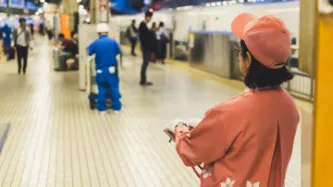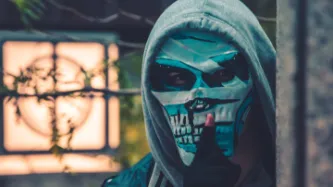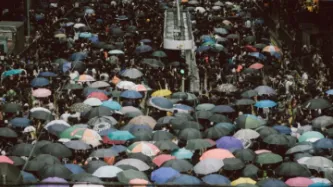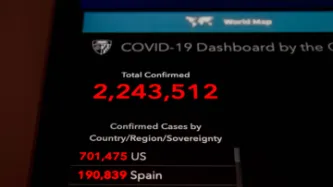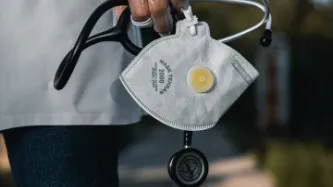Advanced Search
Content Type: Examples
Among several other digital contact tracing options, the New Zealand government is considering distributing Bluetooth enabled credit card-sized "CovidCards" to all 5 million New Zealanders. The card solves some problems such as lack of access to or comfort with smartphones for 19% of the population, and opting out would be a simple matter of leaving the card at home.
The private consortium backing the card estimates, based on Singapore's experience and the fact that 51% of smartphone…
Content Type: Examples
In February, before the pandemic was declared, the Myanmar Post and Telecommunications Department set a deadline of April 30 for citizens to register their mobile phone SIMs, a move the PTD said was necessary to enhance the security of electronic transactions and cut down crime.
The PTD issued an official reminder on April 16, and confirmed on April 29 that other than websites and applications for registration operators would be required to block calls and data for unregistered users on the…
Content Type: Examples
Citing privacy concerns, the Knesset’s Foreign Affairs and Defence Committee voted to block the Israeli government’s request for an extension to police powers to requisition mobile phone roaming data relating to those ordered to quarantine for enforcement purposes.
Access had been granted for a month, and was due to expire. In the month the police had access, they conducted around 500 random mobile phone location checks per day, drawn from a list of 13,500 people provided by the Health…
Content Type: Examples
The Indian authorities have said that the country's contact-tracing app, Aarogya Setu ("health bridge", in Sanskrit), will be voluntary - but mandatory for federal government employees, food delivery workers, and some other service providers. It may also be needed to access public transport and airports after the nationwide lockdown is lifted.
The app uses Bluetooth and location services to trace users' contacts, and keeps the personal data it collects on the phone, encrypted, until it is…
Content Type: Examples
The Internet Freedom Foundation has sent a legal notice to the Broadcast Engineering Consultants India, Limited (BECIL), a public sector undertaking under the Ministry of Information and Broadcasting, calling on the organisation to modify a tender seeing procurement of a "Personnel Tracking GPS Solution" and "COVID-19 Patient Tracking Tool" intended for the organisation's employees.
IFF is concerned that the procurement items, while nominally intended to address health risks, will certainly…
Content Type: Examples
The mother of a six-month-old baby in Aurora, Ontario was fined C$880 after police accused her of standing for more than two minutes under a gazebo in a park; she claims she pulled into the gazebo to allow people to pass on the path and answered a text before moving back onto the path. The mother reported that the police officer who issued the fine did not observe social distancing and was not wearing personal protective equipment. The incident occurred a week after the city of Toronto stopped…
Content Type: Examples
Under Ontario's Emergency Management and Civil Protection Act, which prohibits gatherings of more than five people, public health officials in Ottawa are pushing citizens to avoid even apparently innocuous activities such as talking across a fence to a neighbour or drinking a beer on your home's driveway with a friend, on the grounds that these can escalate into parties.
Source: https://ottawacitizen.com/news/local-news/physical-distancing-loopholes-need-to-stop-ottawa-health-official-says/…
Content Type: Examples
In one of its pandemic-related emergency orders, the Canadian province of Ontario has extended to police officers, First Nations constables, special constables, and municipal by-law enforcement officers the power to require those facing charges under the emergency laws to give their name, date of birth, and address or face fines of up to C$750 for non-compliance.
Source: https://toronto.ctvnews.ca/those-violating-ontario-s-emergency-orders-must-id-themselves-or-face-steep-fine-1.4877062…
Content Type: Examples
Canadian federal, provincial, and territorial governments across have put in place numerous emergency measures to curtail behaviour in order to curb the spread of COVID-19. The orders include placing people under quarantine, limiting gatherings, closing schools and businesses, barring most visits to long-term care homes, prohibiting price gouging on necessary goods, and permitting audiovisual witnessing of signatures on wills and powers of attorney.
Source: https://www.intrepidpodcast.com/blog…
Content Type: Examples
Every person placed in quarantine in Bahrain will be required to wear an electronic bracelet to ensure compliance. Mohammad Ali, head of electronic government, said that people fitted with the bracelets will have to stay within 15 metres of their mobile phones, which will be linked to the bracelets via the country's contact tracing app BeAware.
Violators face one or both of a minimum of three months in jail or a fine of between BHD1,000 (£2,140) and BHD10,000 (£21,400). Those in quarantine may…
Content Type: Examples
Two million people downloaded Australia's COVIDSafe app in the first four days it was available; the government's goal is to reach 10 million, or about 40% of the population. Users are asked for a (not necessarily real) name, age, mobile number, and postal code. The app exchanges a Bluetooth handshake when it comes within 1.5 metres of another app user, then logs the handshake and encrypts the exchange.
The data is used to notify users if they have come within close contact for 15 or more…
Content Type: Examples
The automated facial recognition company Clearview AI has suggested to US federal and state authorities that its facial biometrics could leverage cameras already in place at gyms and retailers in order to identify individuals in the interests of contact tracing.
Simultaneously, the company is asking for a stay in a privacy lawsuit in federal court in Illinois under the state's Biometric Information Privacy Act. The company wants the case to be moved to the Southern District of New York, where…
Content Type: Examples
To speed up daily temperature checks, Amazon has installed thermal cameras to screen workers for coronavirus symptoms in its warehouses around the world. Cases of COVID-19 have been reported at more than 50 of the company's US warehouses. Thermal cameras will also replace thermometers at staff entrances to many of Amazon's Whole Foods stores. Workers have claimed it is almost impossible to socially distance inside the warehouses.
Source: https://www.bbc.co.uk/news/technology-52356177
Writer:…
Content Type: News & Analysis
As parts of the world are preparing to go back to factories, offices, and other workplaces, or in the case of Amazon, trying to make continually unsafe workplaces less hazardous, we must be on the watch yet again for profiteering, data-grabs, and surveillance as a solution to an undefined problem.
Many of the measures are predicated on the idea of catching employees who are sick. But, why do employers think that employees are or will lie about their health? Is it because they love their jobs…
Content Type: Explainer
In a scramble to track, and thereby stem the flow of, new cases of COVID-19, governments around the world are rushing to track the locations of their populace.
In this third installment of our Covid-19 tracking technology primers, we look at Satellite Navigation technology. In Part 1 of our mini-series on we discussed apps that use Bluetooth for proximity tracking. Telecommunications operators ('telcos'), which we discussed in Part 2, are also handing over customer data, showing the cell towers…
Content Type: Long Read
This week saw the release of a coronavirus tracking app within the United Kingdom, initially to be trialled in the Isle of Wight. Privacy International has been following this closely, along with other ‘track and trace’ apps like those seen in over 30 other countries.
The UK’s app is no different. It is a small part of a public health response to this pandemic. As with all the other apps, it is vital that it be integrated with a comprehensive healthcare response, prioritise people, and…
Content Type: Long Read
On 12 April 2020, citing confidential documents, the Guardian reported Palantir would be involved in a Covid-19 data project which "includes large volumes of data pertaining to individuals, including protected health information, Covid-19 test results, the contents of people’s calls to the NHS health advice line 111 and clinical information about those in intensive care".
It cited a Whitehall source "alarmed at the “unprecedented” amounts of confidential health information being swept up in the…
Content Type: Long Read
Coronavirus-related lockdown measures have impacted almost 2.7 billion workers, with some countries seeing unprecedented levels of applications for welfare benefits support.
In response, emergency relief legislation for welfare recipients has been fast-tracked worldwide, from the UK to Brazil. These measures, combined with the growing awareness of Covid-19's differentiated impact along the fault lines of class, race, gender and legal status, rightly seek to address the needs of…
Content Type: Long Read
Today, migrant communities in the UK already face multiple well-documented obstacles in accessing healthcare, not least because of charges to access the National Health Service (NHS), as it is the case for non-EU migrants, and legitimate fears of data-sharing between the NHS and the Home Office.
In the current pandemic, in addition to these concerns, asylum-seekers face an impossible choice: risk exposure to coronavirus, or be unable to apply for asylum.
Individuals seeking…
Content Type: Long Read
UPDATE 21/07/2020: On Monday July 20th, the Israeli parliament approved a new bill allowing the Ministry of Health to rely again on the Intelligence Services to track people who may have been exposed to Covid 19 when the number of new cases reaches 200 and above per day. The authorisation is then granted for three weeks and can be extended if the numbers have not decreased. The new law will be effective until January 2021. As of July 21st and for at least the next three weeks, the Intelligence…
Content Type: Press release
Photo by Ashkan Forouzani on Unsplash
Today Privacy International, Big Brother Watch, medConfidential, Foxglove, and Open Rights Group have sent Palantir 10 questions about their work with the UK’s National Health Service (NHS) during the Covid-19 public health crisis and have requested for the contract to be disclosed.
On its website Palantir says that the company has a “culture of open and critical discussion around the implications of [their] technology” but the company have so far…
Content Type: Examples
Police will be barred from accessing metadata collected by Australia's proposed coronavirus contact tracing app, which will be able to identify when users have been 1.5 metres of each other for more than 15 minutes, Australia's government services minister, Stuart Robert, and prime minister, Scott Morrison, have promised. Only state health investigators will access the data, even though experts say that the 2018 telecommunications laws potentially allow law enforcement access. Critics are…
Content Type: Examples
The US Department of Health and Human Services has awarded a contract to build a database system, HHS Protect Now, to track the spread of the coronavirus across the US to the data-mining company Palantir. Palantir founder and investor Peter Thiel was US president Donald Trump's earliest and highest-profile Silicon Valley backer. The platform pulls data from across the federal, state, and local governments as well as health care facilities and colleges, and works with the Centers for Disease…
Content Type: Examples
NHS England is using Yoti's digital ID card solution to verify health care workers' identity; the cards are added to staff phones, enbaling them to use a contactless ID app to prove their identity both online and offline. Yoti is providing the system for free for three months to all public health organisations, emergency services, and community initiatives working to contain the pandemic.
Source: https://www.biometricupdate.com/202004/uk-national-health-service-rolls-out-yotis-biometric-…
Content Type: Examples
The Turkish Health Ministry's Pandemic Isolation Tracking Project is using mobile device location data to track patients diagnosed with COVID-19 and ensure they obey the government's quarantine requirements. Violators will be sent warning messages and their information will be shared with the police if they do not return to isolation. Law enforcement officers can access individuals' information during road stops. Before launching the system, the Communications Directorate obtained permissions…
Content Type: Examples
When the phone belonging to an American University student in Taiwan, who was subject to 14 days' quarantine after returning from Europe, ran out of battery power, in less than hour he had received phone calls from four different local administrative units, a text message notifying him he would be arrested if he had broken quarantine, and a visit from two police officers. The phone tracking system uses phone signals to triangulate locations of the more than 6,000 people subject to home…
Content Type: Examples
By May 11, the Swiss Federal Office of Public Health, working with EFPL and ETH Zurich, will launch a secure, decentralised system for contact tracing developed by the Decentralised Privacy-Preserving-Proximity Tracing (DP-3T) international consortium, whose Swiss partners are Ubique and PocketCampus. Other international partners include UCl, KU Leuven, TU Delft, the University of Oxford, and the Universirty of Torino. The system has been posted to Github as an open source protocol and will…
Content Type: Examples
A data breach that posted 100 to 200 names, email addresses, and encrypted passwords online was found in the Belgian Covid-19 Alert! app, one of seven candidates for adoption by the Dutch government. The app identifies phones that have been close to each other via Bluetooth signals and can send them a message when one owner tests positive. The developers said the data leaked from a database relating to another project when the source code was hurriedly placed online for government scrutiny.…
Content Type: Examples
Liechtenstein is the first European country to use biometric electronic bracelets to implement a real time coronavirus tracking programme. The bracelet, which sends skin temperature, breathing, and pulse, among other metrics, for analysis in a Swiss lab, is being offered to 5% of the population. The country, which acted early to prevent the epidemic, plans to roll the bracelets out to the entire population by autumn.
Source: https://inews.co.uk/news/health/coronavirus-testing-latest-…
Content Type: Examples
Thousands of Israelis have been ordered into quarantine without any right of appeal based on cellphone tracking that may be wrong because phone geolocation is insufficiently fine-grained to tell the difference between two people being in the same room and being separated by a door when dropping off and receiving a food delivery. Numerous agencies are performing the kind of tracking formerly carried out only by the domestic security agency, Shin Bet. Among them are Shin Bet itself, which is…
